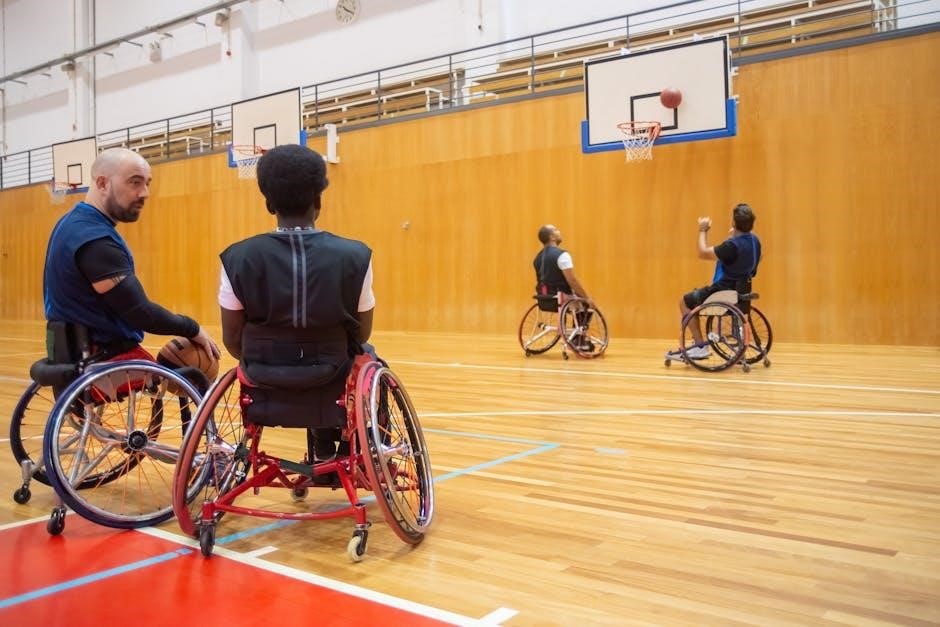Discover free diversity and inclusion training materials to promote equity and belonging in workplaces and educational settings․ These PDF resources offer cost-effective, accessible tools for fostering inclusive environments and empowering individuals to address biases, improve cultural competence, and support diverse teams effectively․
What Are Diversity and Inclusion Training Materials?
Diversity and inclusion training materials are resources designed to educate individuals on promoting equity, addressing biases, and fostering inclusive environments․ These tools, often available as free PDF downloads, include workbooks, activity guides, slide decks, and toolkits․ They provide practical exercises, facilitation tips, and frameworks to help participants understand and navigate differences such as race, gender, culture, and socio-economic backgrounds․ For example, The Diversity and Inclusion Handbook and Toolkits for Workplace Inclusivity offer actionable strategies for creating inclusive spaces․ These materials cater to various learning styles, enabling organizations to adapt them into microlearning courses or workshops․ Their goal is to equip individuals with the skills to function effectively in diverse and complex settings, ensuring a culture of belonging and respect․
Why Focus on Diversity, Equity, and Inclusion in the Workplace?

Emphasizing diversity, equity, and inclusion (DEI) in the workplace fosters a culture of belonging, innovation, and collaboration․ A diverse workforce brings varied perspectives, enhancing creativity and problem-solving․ Equity ensures fair opportunities and treatment for all employees, addressing systemic inequities․ Inclusion creates an environment where everyone feels valued and empowered to contribute․ Free diversity and inclusion training materials, such as PDF guides and workshops, help organizations implement these practices․ They provide tools to address biases, improve cultural competence, and promote equitable policies․ By prioritizing DEI, companies can enhance teamwork, productivity, and employee satisfaction, leading to better business outcomes and a stronger social impact․ These initiatives are essential for building a resilient and forward-thinking organization in today’s globalized world․
Types of Free Diversity and Inclusion Training Materials
Free resources include workbooks, activity guides, presentations, slide decks, and toolkits․ These materials provide practical exercises, workshops, and strategies to promote diversity, equity, and inclusion in various settings․

Workbooks and Activity Guides
Workbooks and activity guides are essential tools for fostering diversity, equity, and inclusion․ These resources often include interactive exercises, group discussions, and reflection prompts to engage participants․ Designed for hands-on learning, they provide practical strategies to address biases, improve communication, and promote inclusivity․ Many workbooks are structured for workshops or training sessions, offering flexibility in duration, from one-day events to multi-session programs․ They also include tips for facilitators to ensure effective dialogue and skill development․ Available in PDF formats, these materials are easily accessible and adaptable for various audiences․ By focusing on real-world scenarios, workbooks and activity guides empower individuals and teams to create more inclusive environments, making them invaluable for organizations committed to diversity and inclusion initiatives․
Presentations and Slide Decks
Presentations and slide decks are powerful tools for delivering diversity and inclusion training․ These materials are designed to engage audiences with visually appealing layouts, clear key points, and interactive elements․ Many slide decks are tailored for trainers and educators, offering structured content on topics like unconscious bias, cultural competence, and equity․ They often include real-world examples, statistics, and actionable steps to foster meaningful discussions․ Available in PDF formats, these resources are easy to download and customize for specific audiences․ Whether for workshops, classrooms, or workplace training, presentations and slide decks provide a dynamic way to educate and inspire individuals to promote inclusivity and respect in their environments․ Their flexibility makes them ideal for both in-person and virtual learning settings․
Toolkits and Resource Manuals
Toolkits and resource manuals are comprehensive guides designed to support organizations in implementing diversity, equity, and inclusion initiatives․ These detailed resources often include practical strategies, exercises, and frameworks to address specific challenges․ They cover topics such as unconscious bias, cultural competence, and creating inclusive environments․ Many toolkits are tailored for HR professionals, educators, and leaders, providing actionable steps to foster equity and belonging․ Resource manuals may also include customizable templates, case studies, and best practices for facilitating discussions․ Available in PDF formats, these tools are easily accessible and adaptable for various settings, from workplaces to educational institutions․ By leveraging these resources, organizations can create systemic change and promote a culture of inclusion and respect․

Benefits of Using Free Diversity and Inclusion Training Materials
Free diversity and inclusion training materials provide cost-effective, accessible resources for fostering inclusive environments․ They offer flexibility for various learning styles and practical tools to enhance workplace culture and equity initiatives․
Cost-Effective Solution for DEIB Education
Free diversity and inclusion training materials provide an affordable solution for implementing DEIB education․ These resources eliminate financial barriers, making it possible for organizations of all sizes to promote equity and inclusion․ By offering PDF guides, workbooks, and activity kits, these materials ensure accessibility for teams worldwide․ They also cater to various learning styles, allowing employees to engage with content at their own pace․ This cost-effective approach enables organizations to allocate resources to other initiatives while fostering a culture of belonging․ Free materials empower leaders to create inclusive environments without compromising on quality, ensuring DEIB principles are integrated into everyday practices․ This accessibility makes DEIB education a priority for all, regardless of budget constraints․
Accessibility and Flexibility for Various Learning Styles
Free diversity and inclusion training materials are designed to accommodate diverse learning preferences․ These resources, often available in PDF and other digital formats, can be easily accessed on various devices, ensuring flexibility for learners․ They incorporate interactive elements, such as workbooks, slide decks, and activity guides, to engage different learning styles․ Whether through self-paced modules or group exercises, these materials cater to visual, auditory, and kinesthetic learners․ Their adaptability allows organizations to tailor training to specific needs, ensuring all employees can participate meaningfully․ This flexibility makes it easier to foster an inclusive culture, as everyone can access and benefit from the content in a way that suits them best․ This approach promotes equity and ensures no one is left behind in DEIB education․
Practical Applications for Workplace Improvement
Free diversity and inclusion training materials offer actionable strategies for workplace improvement․ These resources, available in PDF and other formats, provide tools like workbooks, activity guides, and presentation slides that can be used in team-building exercises, leadership development, and employee onboarding․ They help address unconscious bias, improve communication, and foster collaboration among diverse teams․ Many materials include practical exercises to enhance cultural competence and create inclusive policies․ By leveraging these resources, organizations can implement initiatives that promote equity, address microaggressions, and build a culture of belonging․ These materials also offer templates for diversity action plans and assessments to measure progress, making them invaluable for driving meaningful workplace change and ensuring long-term success in DEIB efforts․

How to Access and Utilize Free Diversity and Inclusion Training Materials
Access free diversity and inclusion training materials through recommended websites, download PDF resources, and utilize them for workshops, employee training, or organizational development to foster inclusive cultures and address workplace challenges effectively․
Recommended Websites and Platforms for Download
Access free diversity and inclusion training materials from reputable platforms like NIU’s Diversity Toolkit, Microsoft’s Inclusion Resources, and UNESCO’s Inclusive Education guides․ Websites such as Coursera, LinkedIn Learning, and Google Workspace offer downloadable PDF resources for DEIB education․ Additionally, platforms like GLAAD and WFH Equity provide toolkits and policy templates․ These sites cater to various learning styles, ensuring accessibility and flexibility․ Explore these resources to kick-start your organization’s diversity and inclusion initiatives effectively․
Steps to Implement the Materials in Your Organization

Start by assessing your organization’s specific needs and goals for diversity and inclusion․ Engage leadership to champion the initiative and ensure alignment with company values․ Facilitate training sessions using downloaded PDF materials, incorporating interactive exercises and discussions․ Assign clear roles to HR or DEI teams to oversee implementation․ Provide opportunities for feedback and reflection to gauge effectiveness․ Monitor progress and adjust strategies as needed․ Encourage continuous learning by integrating the materials into ongoing professional development programs․ Celebrate successes and share insights to foster a culture of inclusion and belonging across all levels of the organization․
Best Practices for Facilitating Effective Training Sessions

Create a safe and inclusive environment by establishing ground rules for respectful dialogue․ Use interactive and engaging methods, such as group discussions, case studies, and role-playing, to encourage active participation․ Incorporate real-world examples and personal stories to make the content relatable and impactful․ Provide opportunities for reflection and feedback to ensure understanding and foster growth․ Utilize visual aids and accessible formats to cater to diverse learning styles․ Encourage open communication and address challenging topics with sensitivity and expertise․ Follow up with additional resources and support to reinforce learning and promote long-term change․ Regularly evaluate the effectiveness of the training to ensure it meets organizational goals and participant needs․



